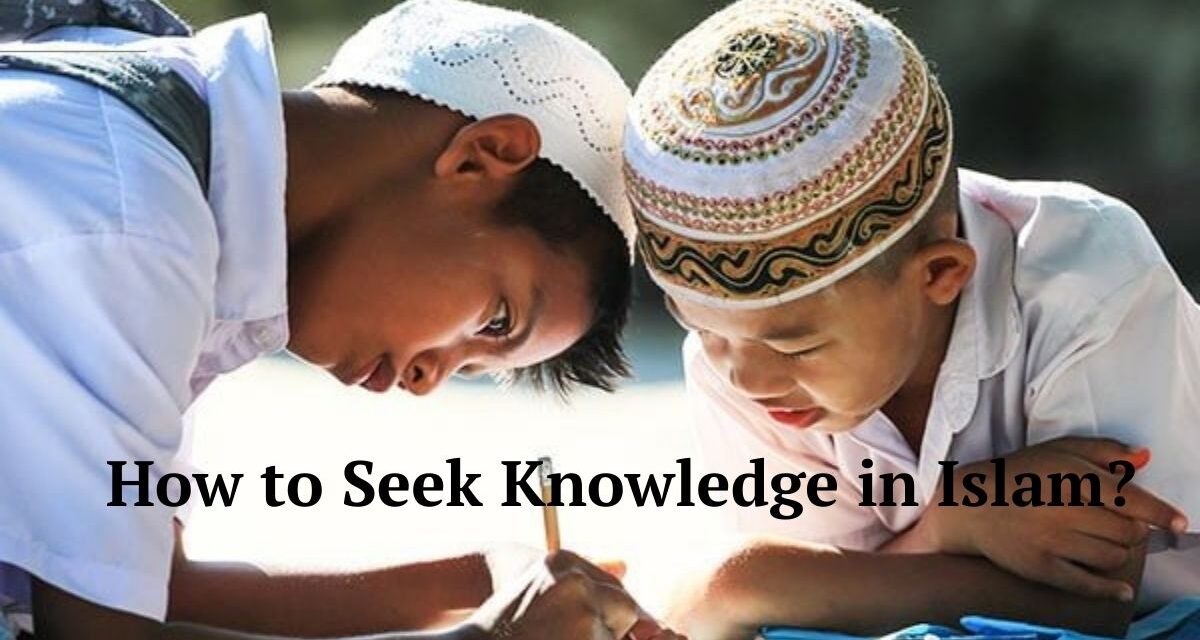Ok, so there is something about Islam that interests you. You desire to learn more about Allah, His Prophet ﷺ and His religion. Quite naturally, you would need to study Islam first. Hence the question, ‘How to start seeking knowledge in Islam?’
A few points to note though;
- This post is for Muslims who want to study Islam and understand their religion well. It might not help a person who is agnostic to Islam in deriving meaning from the suggested books. Someone more learned in the field would be fit to answer for them.
- Real knowledge lies in the books of classical scholars of Islam, and every effort must be taken to study from their books and writings. However it is true that in order to understand and decipher knowledge of classical scholars, you need to get equipped to study them, hence my suggested curricula.
- No scholar or books is free of error, and no impatience should be shown in propagating every new idea that you learn.
- Just as their is a way to pray and worship in Islam, their is a way to study. Although it is not impermissible to take up books on Islam and read randomly, guided steps in studying the religion are beneficial for a student of Islam.
This blog is hoped to help a Muslim who is completely new to the knowledge of Islam in taking measured steps in developing himself as a student of Islam. It will InshaAllah benefit someone who has no prior experience into studying Islamic Sciences, but believes in its truth. I pray that a new seeker of knowledge finds it easy to study Islam through this route and doesn’t get lost in the various academic subjects, themes or issues that Islamic academia deals with. I write this after being a part time student for about 10 years, who carved out a plan for himself after multiple failings.
I pray to Allah to make this effort sincere, and competent enough to give a good starting point to a beginner student of Islam.
Generally speaking, Islam like any other subject can be divided into modules, or sub-subjects. There are many of them, and not all are of the same level; in importance or in difficulty. Some Islamic sciences are a must to be studied, while others are only for the specialists. Some are easy to understand, whereas others are complex. Some are time consuming, while others are brief.
But, it has to be established first and foremost that there are two major branches of study in Islam:
- Actual Applied Knowledge (Uloom ul Ghayah)
- Sciences Pertaining to the Tools of Studying Knowledge (Uloom al Wasail / Uloom al Alaa)
In order to understand knowledge that is applied, we have to learn the tools that make it easy to understand this heavenly revelated knowledge.
Within the ambit of applied knowledge, we have:
- Creed & Belief (Aqeedah)
- Applied Law (Fiqh)
- Understanding the Life of the Prophet ﷺ (Seerah)
- Explanation of the Quran (Tafsir)
- Understanding of the Sayings & teachings of the Noble Prophet Muhammad ﷺ (Sharh al-Hadeeth)
On the other hand, within the purview of the sciences that pertain to the tools of knowledge, we get:
- The Arabic Language
- Principles of Understanding the Revealed Texts (Usool al Fiqh)
- Principles Related to the Methodology of Studying Hadeeth (Mustalah al Hadeeth – Uloom al Hadeeth)
- Principles Related to Interpreting the Quran or generally the Sciences of Quran (Usool at Tafseer – Uloom al Quran)
- The Legal Maxims of Islam (Qawaid al Fiqhiyyah)
- History (Tareekh)
- Logic (Mantiq)
- Philosophy (Kalaam)
These are generally the sciences meant to study in Islam. There can be more sub-fractions as you go deeper into studying each. But for a student of knowledge, these many would suffice and actually, be more than enough to study. Although the subjects can be further divided, it is enough for a Muslim to know these subjects at a basic level. These would help him to understand Islamic law and creed well. Without knowing these subjects, a person may easily be led astray with confusing information that is bombarded at us today.
As an example, we can sub-divide the study of Arabic into more branches:
- Language (Luggah)
- Grammar (Nahw)
- Morphology (Sarf)
- Literature (Adab)
- Rhetoric (Kalaam)
- Eloquence (Balagah)
This was just an introduction to prepare you in what lies ahead, and by no means is it a comprehensive coverage of topics. Now. let’s get into the meat of the discussion.
How to Start Seeking Knowledge of Islam?
It is incumbent upon a Muslim to know three things with partial details. They are:
- Who is Allah?
- Who is the Messenger of Allahﷺ?
- What is Islam?
These three topics are from the most important subjects that a common Muslim should concern himself with. So, the main books that I recommend at this level are:
Getting to Know Allah
Fundamentals of Tawheed by Dr. Abu Ameenah Bilal Philips: This is a fundamental book that deals with our belief with regards to our God, Allah. Presented in plain English, Dr. Bilal has done well in condensing the topics of a couple of classical books.
Another book that is good at this stage is a book about Knowing Allah by Dr. Umar al Ashqar. It has been translated into english by IIPH. Dr. Ashqar has actually written a full book on the complete belief of a Muslim explaining the 6 pillars of faith in detail.
Getting to Know the Messenger of Allah ﷺ
When the Moon Split by Safi ur Rehman al Mubarakpoori: This is a concise, yet a comprehensive book on the life of Prophet Muhammad ﷺ with a very minimal amount of weak narrations. This should be the second book that you study,
Now, after studying about Allah and His Messenger ﷺ, we have to move towards studying Islam both in terms of law and spirituality.
Understanding the General Islamic Law
The Concise Presentation of Fiqh by Dr. Abdul Azeem Badawi: In this book, Dr. Badawi combines between Fiqh and Hadeeth. The scholar who is a known authority in the Shafiee Fiqh does not push himself to study a single school of though, but presents his own conclusions in every legal issue that he discusses.
Moving Ahead to Learn Islamic Spirituality
A fine book for a beginner student of Islam is the book Riyaad as Saliheen by Imam an Nawawee. The imam was a major scholar from the past and has collected some ayaat of the Quran and countless sayings of the Prophet ﷺ that help a person in understanding the general nature of goodness and spirituality in Islam. A short commentary on this book is also a great addition.
Now, this much of reading will give you enough knowledge to worship Allah with insight at a basic level. You would now need to go on to study the meanings of Quraan and preferably study Arabic to interact with Islamic texts at a deeper level.
With regards to meanings of the Quraan, you may read the translation of the Quran by Dr. Muhammad Muhsin Khan and Taqi ud Din al Hilalee. But you must remember that translations are always deficient and will never suffice.
Since I mentioned that a translation will not suffice, you would need to study Arabic now. Remember that you will learn Arabic via any course, or with any teacher, provided you remain consistent in studying. Consistency is the key to language learning. If you study for 6 months and forget about the language for another 2 months, you will find it hard to accomplish your objective.
I know of three books that are good for any seeker of Arabic Language .
- Arabic Tutor by Abdul Sattar Khan – This book is completely based on the grammar translation method. You can study this by yourself or with little help of a teacher. This is written in a format through which Arabic is taught in the Indian Subcontinent. The book comes in a series of 4 parts, but studying it up to the third volume should suffice InshaAllah.
- Durus ul Luggatil Arabiyah by Dr. V Abdur Rahim – This is a book that’s’ based on the applied grammar method of learning and would require a teacher to teach it to you. Online videos for teaching this book are present on the internet, and the book has been well taught by Ustadh Asif Mehrali.
- Al Arabiyatu Bayna Yadaik – This is a book that is based on the immersion style of language learning and would need a class or a pure Arabic speaking teacher teaching it to you.
By taking any of these courses, you will learn enough of the Arabic Language, Grammar and Arabic Morphology to move forward and learn Islam in its language; Arabic.
Now, you need consolidate your learning of Arabic by reading books in Arabic. You should read these books in order.
- Qassas an Nabiyeen by Syed Abul Hassan Nadwi
- Mansoorat by Sayyid Muhammed Rabey Hasani Nadwi
- Mukhtarat by Syed Abul Hassan Nadwi
Now, is the time to delve into Islamic Sciences at a deeper level and study it in details. If you get a teacher to teach you from now on, that is the best and the most recommended system of learning. If you are not fortunate enough to find a teacher, you would need to stick to YouTube and audio lessons of a teacher. But try to study with only one or just a few teachers in the beginning so that you don’t confuse things up and scatter your efforts.
From my studies into various curricula, I have the following to recommend.
Start with the Tafsir of the Quran as you are already familiar with the basics. So, hop onto reading Tafsir as Saadi or Tafsir al Jalalayn. Studying them with a teacher is better. If you can listen to the tapes of a scholar such as Shaykh Ibn Uthaymeen, it will be better.
Next, study Mustalah al Hadeeth. In this subject, the best book to study is Nukhbatul Fikr, and if you take its commentary Nuzhatun Nazr as well, then it is even better. If you are not comfortable with Arabic yet, you can check out the book on Usool al Hadeeth by Dr. Bilal Philips.
Once done with the Science of Hadeeth, you should study some Usool al Fiqh, so preferably study the book al Waraqaat with a commentary of a contemporary scholar. You should also study Qawaid al Fiqihhiyyah at this stage. Shaykh Ibn Uthaymeen has a very interesting poem along with explanation explanation which you can go through. I cannot recommend a book in English at this stage, but you can try reading the book Evolution of Fiqh by Dr. Bilal Philps to give you some understanding of the subject.
Now comes in Uloom al Quraan, you can study a book by Imam Suyooti on this subject although its long. Also, a book written by Ibn Taymiah called Muqidimmah Usool at Tafsir with an explination by Shaykh Ibn Uthymeen is beneficial. In English, a book called Usool at Tafseer again by Dr. Bilal Philips will help you a bit.
By now you will be adequately equipped with the basic knowledge of Uloom al Alaa’. Now, it will be good if you study Aqeedah, Fiqh and Hadeeth in tadem.
In Aqeedah there are three books that you should read:
- Kitaab at Tawheed with its explanation al Qawl al Mufid by Shaykh Ibn Uthaymeen
- Aqeedah al Wasitiyyah with its explination by Shaykh Ibn Uthaymeen
- Aqeedah at Tahawiyyah with its explanation by Imam Abil Iz al Hanafi
In fiqh, if you choose the Hanbali Madhab, you can study Umdatul Fiqh, or Zaad al Mustaqni or Dalil at Taalib. In the SHafie Madhab, you can study Matn Abi Shujah, and in the Hanafi Madhab, you can study Mukhtasar al Quduri. If you get a teacher teaching it to you, then that is the most desired method, otherwise pick up a shaykh you’re comfortable with on YouTube. But the minimum you can do about is to ask the most trusted scholar of your locality to guide you to a scholar who can teach these books to you well.
In Hadeeth, start with studying Jami Uloom wal Hikam or if that gets difficult study the explanation of Shaykh ibn Uthaymeen on the book Arbaeen an Nawawiyyah,
And, if you study this much from Islam, you would have a clear concise understanding of the religion and you will be able to move ahead into different subject ease with ease and insight. Hopefully, you would also have found other sincere seekers of Islamic knowledge whom you would collaborate with to learn more. And yes, you should do your utmost to develop a connection with scholars in your region who can guide you without any partisan sectarianship.
Over to You
Here was my opinion on ‘How to Start Seeking Knowledge in Islam?’ and I ask Allah to make this effort sincere and beneficial to everyone who treads this path. But whenever you study, or whatever you study, you always need to keep one thing in mind. There is no book on this earth, and no scholar or a Madhab that doesn’t have a deficiency or an error. Allah has reserved perfection only for His book; the Quran. So, do not allow the Shaytaan to lead you to sectarian partnership and always hold on firmly to the general body of Muslims and be a force towards good.
Always ask Allah to show you the truth as being truer, and ask Him to allow you to follow it, and ask Allah to show you falsehood as falsehood and ask Him to allow you to abstain from it. InShaAllah, this will be a source of divine guidance.







Recent Comments